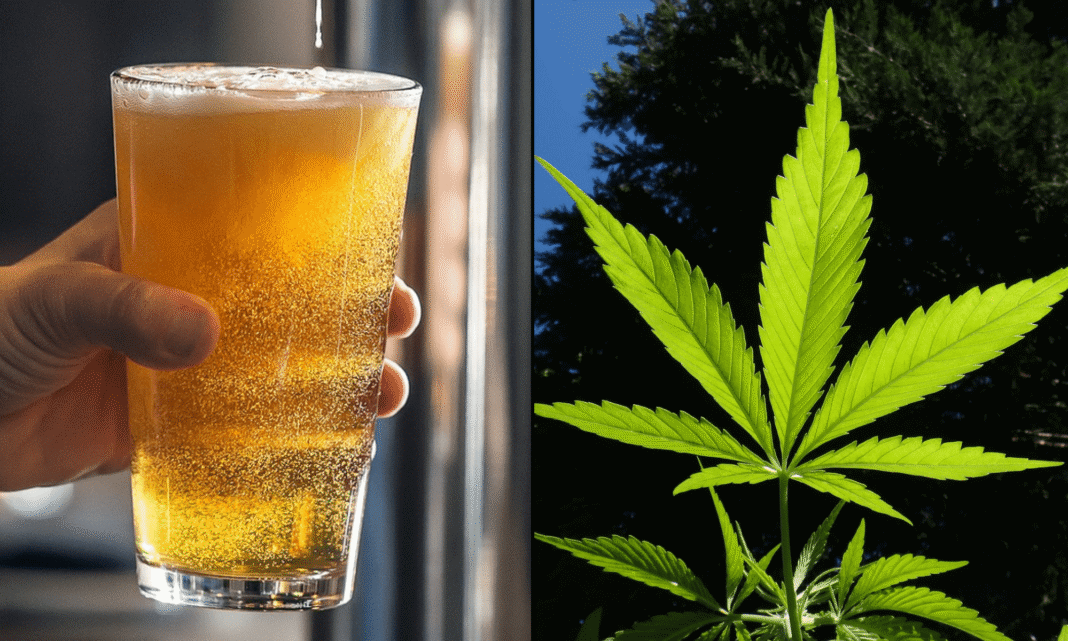In a recent government-funded study, researchers reported that hemp seeds added to beer at the time of brewing could enhance its nutritional value.
“The final product—beer or a barley wort-based beverage enriched with hemp seeds—is characterized by a unique sensory profile and the presence of biologically active compounds,” the paper says. The paper says that the final product combines barley beer’s traditional characteristics with health benefits associated to hemp ingredients.
This month, in the scientific journal Molecules, researchers tested beer brewed using up to 30% malted or unmalted Hemp seeds. They compared them with beers made only from barley malt and 10% malted Hemp seeds as a standard.
“The potential to enhance the functionality of beer products through the addition of Cannabis sativa seeds is based on their rich nutritional profile—including proteins, fermentable sugars, polyphenols, and cannabinoids—which collectively contribute to a unique taste and aroma,” the authors observed. This is supported further by the botanical relation between hemp and hops. Both belong to the Cannabaceae.
Authors noted that, of many “rediscovered”, crops, Cannabis Sativa “holds special place.”
They said that the seeds of this plant are unique in their chemical composition. This includes a full set of amino acids exogenous, high levels of unsaturated fats, as well as a profile rich in polyphenols, cannabinoids, and other compounds. The compounds in these seeds have been shown to exhibit anti-inflammatory and immunomodulatory properties as well neuroprotective qualities, both by in vitro and other studies.
“The addition of hemp seeds, particularly in unmalted form, significantly enriched the wort in polyphenolic compounds—most notably, trans-ferulic and gallic acids—known for their antioxidant and anti-inflammatory activity.”
As to cannabinoid concentration in the seeds, the authors note that “raw hemp seeds exhibit…generally low concentrations in the seed material itself” and that it is “primarily the result of external contamination from resinous trichomes during harvesting and processing rather than natural biosynthesis within the seeds.”
In the new study, researchers tested various cannabinoids, including cannabidivarin (CBDV), tetrahydrocannabivarin (THCV), cannabidiol (CBD), delta9-tetrahydrocannabinolic acid (THCAA), cannabigerol (CBG), cannabinol (CBN), and cannabichromene (CBC).
According to this study, funded by grants provided by the European Regional Development Fund, and the Ministry of Science of the Government of Poland, “the additions of hemp seeds made the wort richer in riboflavin, or vitamin B2, with the effects being stronger in malted seed wort.” Researchers noted that the presence of vitamin B2 “not only increases the nutritional quality of beer, but also promotes yeast metabolism during fermentation.”
The team concluded that “these findings show that hemp seeds in particular, malted, can enrich barleywort with non-psychoactive and bioactive cannabinoids, under standard mashing, without compromising important brewing performance metrics.” Further work is needed on the fermentation process, sensory evaluations, bioavailability, and stability to create hemp-enriched beers.
The researchers, faculty members at the University of Agriculture in Krakow, the Slovak University of Agriculture in Nitra, the University of Lomza, and the University of Warmia and Mazury in Olsztyn, concluded that “the addition of hemp seeds, particularly in unmalted form, significantly enriched the wort in polyphenolic compounds—most notably, trans-ferulic and gallic acids—known for their antioxidant and anti-inflammatory activity.”
Malted hemp seeds were found to improve the absorption of vitamins B, especially thiamine. The highest concentrations of these vitamins are seen in the malted seeds with 30%.
The authors noted that “hemp is rich in cellulose, and its extracts contain mainly glucose and xylose—a hemicellulose sugar that is not utilized by conventional brewing yeast.” The authors warned however that selecting the appropriate processing method and optimizing cost for production of hemp beer were current technical challenges.
Highlighting hurdles to incorporating this novel brewing method, they noted that “despite the growing recognition of hemp as a raw material for the food and pharmaceutical industries—with a compound annual growth rate of 17.1% for the hemp market from 2023 to 2030—its application in fermentation biotechnology remains underexplored.”
The study’s results come as a new survey found that younger Americans are increasingly using cannabis-infused beverages as a substitute for alcohol—with one in three millennials and Gen Z workers choosing THC drinks over booze for after-work activities like happy hours.
More research sheds light on cannabis’ nutritional benefits. A new study suggests that hemp seed oil and hemp seeds can be combined to create a gluten-free mix with a “baked texture that is optimal” as well as delivering “significant nutrition impact.”




